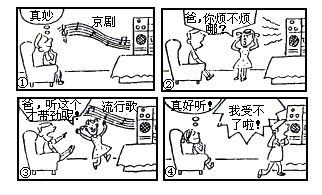网址:http://m.1010jiajiao.com/timu3_id_3028763[举报]
| |||||||||||||||||||||||||||||||||||||||||||||||||||||||||||||||||||||||||
| |||||||||||||||||||||||||||||||||||||||||||||||||||||||||||||||||||||||||
书面表达
假如你是图中女孩 一名当代中学生、独生女,非常喜爱流行音乐,而你的父亲在工作之余喜欢京剧.请你根据下面图画写一篇短文,描绘在一个星期天发生在你家的情景.
一名当代中学生、独生女,非常喜爱流行音乐,而你的父亲在工作之余喜欢京剧.请你根据下面图画写一篇短文,描绘在一个星期天发生在你家的情景.

注意:1.短文中应含有对话;
2.词数100左右;
3.以第一人称写.
参考词汇:sitting-room(客厅);Beijing Opera(京剧);Stereo(立体音响设备).
查看习题详情和答案>>| We should not blindly describe the real estate (房地产) sector as being “overheated”. Certainly, an over-optimistic (过分乐观的) anticipation of property price has led to blind investment in some places. But that’s an isolated phenomenon. It does not tell the whole story. Some would argue the current supply of houses outweighs the demand, as the country’s idle housing space has reached 100 million square meters. But can we infer from this figure that the real estate sector is overheated? Let’s pause and consider. Suppose 20 percent of urban households want to improve their living conditions and each of them expect to enlarge their houses by 20 square meters. With both figures underestimated, there would be 2.7 million urban households wanting to buy larger houses and 540 million square meters of properties should be available in total. The calculation is by no means unrealistic. You can feel that the huge demand is real from your daily contacts with friends. Now my question is: Do we have idle space of 540 million square meters? Suppose further that commodity (日用品) prices would rise as a result of overheated investment. But have we witnessed a rise in the prices of bricks, tiles or stones? No. China’s overall price level has just inched up by 0.3 percent. It does not indicate inflation (通货膨胀). Suppose again that an overheated real estate sector has siphoned (吸取) too much capital from other sectors of the economy. But have we witnessed a shortage of funds in other sectors? No. Have we witnessed a real interest rate higher than the nominal one? No. This is the biggest difference between the real estate today and that in the early 1990s. 1. What is discussed in the passage? (In English) 2. According to the passage, what is the author’s opinion to the real estate? (In English) 3. What does the underlined word “idle” in the second paragraph mean in Chinese? 4. 把第一段的划线部分变成一个含有定语从句的句子。 5. Translate the underlined sentence in the third paragraph into Chinese.
|
查看习题详情和答案>>